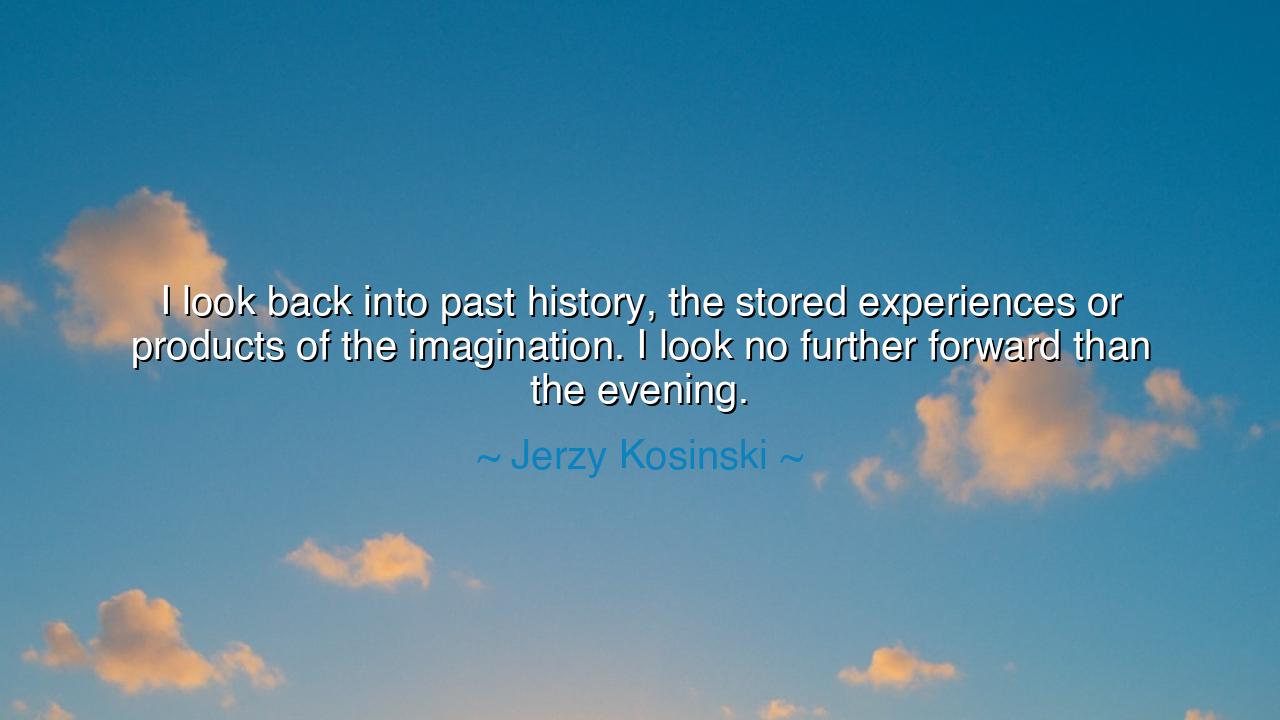
I look back into past history, the stored experiences or products
I look back into past history, the stored experiences or products of the imagination. I look no further forward than the evening.






“I look back into past history, the stored experiences or products of the imagination. I look no further forward than the evening.” — thus spoke Jerzy Kosiński, the wandering soul who lived between memory and fiction, between exile and creation. These words are not the idle musings of a dreamer but the reflection of a man who had seen the fragility of time and the unreliability of destiny. In them lies a profound wisdom: that life, in its deepest truth, is composed of memory and imagination — the echoes of what has been and the fleeting shimmer of what might yet come. For Kosiński, the past was a library of human experience, and the present moment, a fragile bridge stretching no further than the evening ahead.
The origin of this thought is rooted in the life of the man himself. Born in war-torn Poland, Kosiński grew up surrounded by the ruins of history and the ghosts of survival. His childhood was shaped by disguise and reinvention, for he survived the Holocaust by assuming false identities. Thus, the past was not a distant tale to him — it was both his burden and his inheritance. Yet rather than flee from it, he turned it into art. In his novels, such as The Painted Bird and Being There, he used the imagination to transform horror into meaning, chaos into pattern. His words reveal the stance of one who has learned not to seek salvation in the uncertain dawn of tomorrow, but to draw strength and insight from the deep well of what already is — the accumulated history and imagination of humankind.
When Kosiński speaks of “the stored experiences or products of the imagination,” he is describing the twin pillars of human understanding. The past gives us experience — the lessons carved into the bone of our species. The imagination gives us meaning — the power to interpret, to transform, to find beauty even in sorrow. History alone, without imagination, is a ledger of dust; imagination alone, without history, is a dream unmoored. Together, they form the living fabric of consciousness. Kosiński knew this balance well: as a writer, he stood at the threshold between remembrance and creation, knowing that every story is both real and imagined, every truth both remembered and invented.
His second confession — “I look no further forward than the evening” — is an act of humility before the mystery of existence. It is not despair, but acceptance. It is the wisdom of one who has seen how fragile plans can be, how swiftly the future erases itself. To live only until evening is to live fully within the bounds of the day — to honor the present without being crushed by the weight of what may come. In the ancient world, the philosophers of the Stoic tradition taught much the same: that life should be lived one day at a time, not in fear of the morrow, but in awareness of the fleeting gift of now. The future belongs to fate; the evening belongs to the soul.
Consider, as an example, the story of Marcus Aurelius, the Roman emperor and philosopher. Surrounded by war, betrayal, and mortality, he wrote his meditations not for conquest, but for peace of mind. “Do not act as if you had ten thousand years to live,” he warned himself. “While you live, while you can, become good.” Marcus, like Kosiński, understood that the horizon of wisdom is not infinite — it is daily. The evening is enough. In that measure of time, one may reflect, create, and cherish. To seek endlessly beyond it is to lose sight of the life already in one’s hands.
Kosiński’s insight also carries an unspoken tenderness. To look backward into history is to commune with the human spirit — to hear the voices of those who lived before us and to let their stories shape our own. To look forward only to the evening is to recognize the limits of control — that destiny is vast, but the heart’s peace is found in simplicity. Between the two — history and evening, memory and presence — the soul finds balance. The mind, too, becomes whole: informed by experience, enlivened by imagination, and calmed by acceptance.
The lesson, therefore, is one of profound equilibrium. Do not live lost in dreams of the future, nor shackled by the weight of the past. Instead, stand between them as Kosiński did — learning from history, drawing upon imagination, and finding contentment in the day’s gentle close. For wisdom is not in knowing what tomorrow will bring, but in understanding what today has already given.
Thus, remember the teaching of Jerzy Kosiński: the past is your teacher, the imagination your companion, and the evening your sanctuary. Look back to learn, look inward to create, and look no further than the horizon of the present day. For in that small compass — between memory and dusk — lies all the beauty, sorrow, and truth a human heart can hold.






AAdministratorAdministrator
Welcome, honored guests. Please leave a comment, we will respond soon